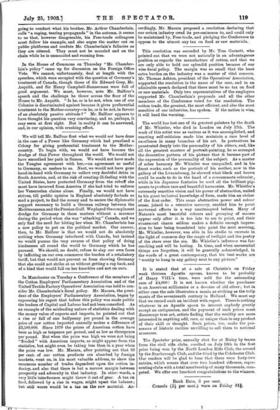The world has lost one of its greatest painters by
the death of Mr. Whistler, who died in London on July 17th. The work of this artist was as various as it was accomplished, and exacting self-criticism made him maintain a rare level of excellence in many branches of his art. In portraiture he penetrated deeply into the personality of his sitters, and, like all the greatest masters of portrait-painting, he so arranged the decorative pattern of his picture that it became part of the expression of the personality of the subject. As a master of sober harmony Mr. Whistler was unequalled, and in his finest works, such as the portrait of his mother, now in the gallery of the Luxembourg, be showed what black and brown could be made to do in the hand of a consummate colourist ; while in his Japanese fantasies he used all the brilliant pig. meats to produce rare and beautiful harmonies. Mr. Whistler's extremely sensitive vision and his power of abstraction, united to his great technical knowledge of form, made him an etcher of the first order. This same abstractive power and colour sense, joined to a retentive memory, enabled him to paint nocturnal effects in a way unattempted before. Many of Nature's most beautiful colours and grouping of masses appear only after it is too late to see to paint, and their evanescent charm seldom makes a definite enough impres- sion to bear being translated into paint the next morning. Mr. Whistler, however, was able in his studio to recreate in the light of common day the magic of twilight and the poetry of the stars over the sea. Mr. Whistler's influence was far- reaching and will be lasting. In time, and when unessential things are forgotten, it will be generally acknowledged, in the words of a great contemporary, that his best works are "worthy to hang in any gallery next to any picture."






































 Previous page
Previous page